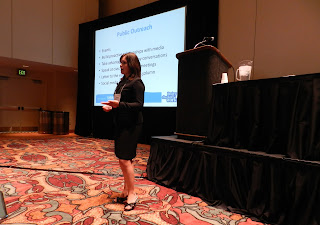Wow, has this been a busy month or what! It's been an extremely fun month, too. I am, however, WAY behind on blogging. I was hoping to have this post out in mid-July, but better late than never I guess. The national Holstein Convention was also in Indianapolis at the same time, so we had a great time seeing the cows--Yes, there were cows in the Indiana Convention Center! Great seeing old friends too!
'Know your story and how to tell it.' This was the title of my presentation at the national American Dairy Science Association meeting this month in Indianapolis. I'm no stranger to public presentations about dairy, but this one was extra special. I've wanted to present at ADSA since I was an undergrad, but since I was a national officer in college, never had the time to present.
I feel like an excited little kid when I see my name in that meeting program.
We're all in this together in the dairy industry and agriculture, and I love helping other dairy advocates more effectively communicate with our consumers.
Here are some take aways from my presentation.
Building effective messages
Start with your key message and key words and phrases, then back it up with three supporting statements (research/science, your experiences, on-farm practices), repeat your key message in closing (repetition makes it memorable). Practice! Does it sound natural? If not, tweak it until it does and then practice until you don't sound rehearsed.
Retraining our brains to communicate science to journalists and consumers
It's ironic that we shouldn't lead with science when communicating science to consumers and journalists. However, people don't care how much you know until they know how much you care, so leading with values is essential to creating a message that will resonate with your audience.
Simplify, simplify, simplify! A good way to think of it is how would you explain what you are trying to communicate to a 4th grader? Avoid using industry jargon, technical terminology or jargon. Put it in perspective--how does what you are telling them fit in with the bigger picture? How does it affect them? Why should they care? Show your passion and enthusiasm, tell a story if you have one that's relevant and avoid dumping a bunch of data on the reporter. You will get a better story out of it.
Use the inverted pyramid: most important facts (summarized), why it is important/what it means, general background information. Again, lead with a value statement and key message and then use this inverted pyramid to craft your message.
Handling difficult questions
The key to effective and successful public outreach is to make it manageable and fun. When handling difficult questions, the best defense is a good offense. Here are some techniques you can use to diffuse a difficult situation.
Be a strong listener: Especially w
hen there are opposing viewpoints, it can be easy to listen to ten seconds of what the other person is saying and then start forming your response. We can't do that. Listen very carefully to everything they are saying and...
Ask questions: You can also clarify and ask for more information. For example, if they said something about how they hear dairy cows are not well cared for, ask how they came to form this opinion. Have they had this experience before? Did someone tell them this? Ask them to help you understand more about this.
Make sure you heard what they said: Repeat it in your own words, but never repeat a negative. If they are again talking about poor cow care, you could say, "I'm hearing that you are asking about how we care for cows on our dairy farm." They will either agree or clarify is that is not what they are asking.
Find common ground: With opposing view points and especially in heated situations, it's important to find common ground. You could say, "I think we can both agree that we are passionate about caring for animals." This diffuses the situation and allows for you to add more information about your experience caring for cows, etc.
Never say 'No Comment': If you don't know, admit you don't know. It's okay. 'No comment' just screams GUILTY to many people, so never say that. If the information they are asking about is confidential, say so. "Unfortunately that information is confidential for right now, but what I can tell you is...."
Every Conversation Counts!
It's not just media interviews or big events that matter. Every day conversations--whether at the grocery store, doctor's office or on an airplane--make a difference.
Good luck in your outreach efforts this summer!!




No comments:
Post a Comment